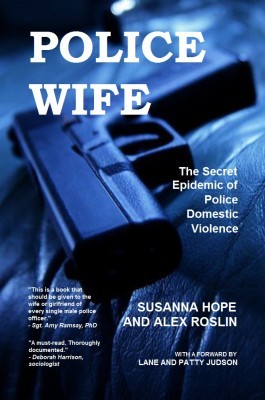“Many enter policing with the best of intentions—to help others and serve their community—and act with honour and courage,” recognizes award-winning investigative journalist Alex Roslin, from Knowlton, Quebec. Police Wife’s coauthor Susanna Hope (a pseudonym) gives several examples of upright officers from her past, some of whom helped save her life. Sadly, Hope’s husband, “Mac,” a heavy drinking cop who often treated her more cruelly than the criminals he was hired to catch, lacked such integrity.

Police Wife
The Secret Epidemic of Police Domestic Violence
Susanna Hope and Alex Roslin
Golden Inkwell Books
$22.95
paper
312pp
9780994861702
Police Wife takes a comprehensive look at a complex topic, pairing up Hope’s first-hand survivor experience with Roslin’s investigative work and analysis of statistics and studies. Though occasionally repetitive, it’s a substantial reference that includes endorsements from experts as well as practical resources for victims in the appendices.
In part one, Hope delivers her memoir in diary format, courageously recounting over twenty years of unthinkable degradation at the hands of her husband. While informative, these entries stick to the bare basics, summarizing events and leaving out details that could deepen readers’ understanding of the “traumatic bonding” mentioned in her afterword. Yet, the author’s synopses make sense within the context of her PTSD – she is the first to admit these pages were written in a “fugue state” – and to her credit, she still gets the main point across, raising awareness. “One day I will break your spirit,” Mac warns after beating her for trying to leave, two years into the marriage. Her spirit miraculously intact, Hope now delivers a loving, hopeful message (her pseudonym is apt) that emanates with compassion, even for her abuser, reminding victims they are not alone.
Focusing mainly on Canada and the United States, with comparisons worldwide, Roslin aims, in part two, to break the “blue wall of silence” that conceals police domestic violence, citing statistics that suggest much higher abuse rates among law enforcement families than the general public. Theorizing on potential causes, he underlines derogatory attitudes towards women, officer impunity, and issues of dominance: “The ability to establish power and control, while an underlying motive of domestic abuse, is an essential job skill for police.” Roslin then discusses how this violence affects us all, stressing the conflict when those hired to protect the public are themselves batterers, and touches upon related issues like the killings of African Americans and the botched investigations of missing or murdered Indigenous women in Canada.
Roslin’s final chapter may be the most hopeful as it confronts the underlying systemic issues, which, if eventually addressed, could benefit everyone, including officers, whose high-risk lifestyles, marked by burnout and exposure to traumatic events, yield high divorce rates and substantially shorter lifespans. “Police families pay a steep price for being on the frontline of upholding our uneven social order,” remarks Roslin, who urges readers to face the truth about police domestic violence: “It is a mirror reflected back on ourselves. May we see and finally act.” mRb






0 Comments